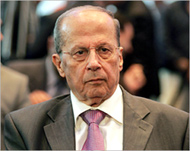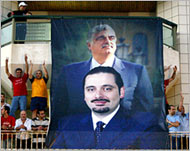Lebanon leader submits cabinet list
Lebanon’s Prime Minister-designate Fuad Siniora has presented Pesident Emile Lahoud with a 24-member cabinet line-up, his second proposal in four days, in an attempt to end a deadlock over the formation of a new government.

Siniora did not say who was on the list, but said it includes members of parliament and political parties, but none of the representatives of Christian leader Michel Aoun.
Siniora said this cabinet line-up had the support of more than 100 legislators in the 128-member parliament.
Lebanon’s president eventually has the final say on the cabinet line-up.
Commenting on the exclusion of his representatives from Siniora’s proposed cabinet, Aoun said on local television networks that he was “neither pleased nor saddened” by it.
“Everything has its advantages and disadvantages. Government is responsibility, and opposition is responsibility too. Therefore, we wish the cabinet success whether we are in it or not,” Aoun said.
Optmistic
“I think this (cabinet) is a very democratically representative of the parliament. I think this is the best that one can really come up with,” Siniora said.
 |
|
Aoun refused to join after he |
“So, this why I believe that this version is something that should seriously be considered and approved,” Siniora said in English after a 25-minute meeting with Lahoud, his second in four days.
After meeting Siniora, Lahoud said he was optimistic the new cabinet would be announced soon after “most existing obstacles” have been overcome.
“The president believes that under present critical conditions and in order to enable the country to confront all challenges and consolidate national unity, the new cabinet should include all parties and no-one should be excluded,” said the statement issued by Lahoud’s office.
Siniora presented to Lahoud on Tuesday a 30-member cabinet line-up, but Aoun and the Shia Muslim groups, Amal and Hizb Allah, had strong reservations over the list, and Lahoud appeared to have rejected it.
Aoun, who had been demanding the foreign ministry portfolio, refused to join the cabinet when he discovered he was not going to get the post.
Sticking points
Two main sticking points have been Aoun’s representation as well as that of Hizb Allah and Amal.
|
“It is a homogeneous team capable of confronting challenges” Fuad Siniora, |
Siniora said, “Insha Allah (God willing), this is a natural matter”, when asked if Hizb Allah is represented in the cabinet. If there is indeed a Hizb Allah member in the proposed line-up and it goes ahead, it will be the first time the organisation is formally represented in Lebanon‘s government.
It was not known how Lahoud, who has demanded that Aoun’s 21-member parliamentary bloc be represented in the government, would approve a cabinet line-up that excluded Aoun’s representatives.
Siniora said that after Lahoud rejected three cabinet proposals, the latest line-up was “the best for a reform government”.
“It is a homogeneous team capable of confronting challenges,” he said.
Siniora, a former finance minister, said the new government needed to be formed quickly to prevent a “political vacuum” in the country and deal with “security deterioration”, referring to Tuesday’s car bomb explosion that targeted outgoing Defence Minister Elias Murr.
Murr, Lahoud’s son-in-law, was wounded in the blast that killed one person and wounded 12 others.
Political vacuum
“The political vacuum is the most dangerous loophole through which conspirators can infiltrate to conspire against the country’s security,” Siniora said.
 |
|
Saad al-Hariri heads the |
The bomb attack deepened fears of increasing violence in the country and was the latest in a string of bombings that have killed or wounded politicians and other prominent figures in Lebanon since the 14 February assassination of former prime minister Rafiq al-Hariri.
Many blamed Syria for the killing.
Syria vehemently denied the claims, but Damascus still withdrew its forces in the maelstrom that followed.
While Lebanon‘s 128-seat parliament is dominated by the anti-Syrian coalition headed by figures such as Siniora and Saad al-Hariri, a son of the slain ex-premier, it doesn’t have a free hand in forming the cabinet, which Lahoud must approve.
The president has signalled he would veto a cabinet list deemed unfair.
Asked whether he will give up efforts to form a cabinet if Lahoud rejected his latest cabinet proposal, Siniora, a trusted aide to the slain al-Hariri, said he will return to al-Hariri’s parliamentary bloc that nominated him for the post of prime minister. “We will then take the decision we deem appropriate,” he said.